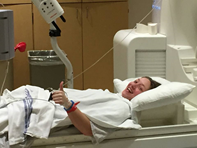Chronically Growing with Diabetes: Control in Managing a Chronic Disease
- Dec 13, 2020
- 3 min read
by Katie Little, MS, CNP, Institute Fellow
Having a sense of control about how one manages their diabetes is a theme I have come across in my diabetes work and research. When I use the word control, I am not referring to blood glucose numbers, but rather general control over all that one is tasked with when managing this chronic condition. In my experience, blood glucose numbers can be unpredictable and cannot be controlled, but only managed. I have also seen control referenced as mastery of diabetes, overseeing of the condition, or daily management of diabetes. I gained more insight on my own sense of control as I looked at it from various perspectives.
I have had the opportunity to participate in two diabetes clinical research studies and sought these opportunities out for several reasons. First, to help further diabetes research in my community, secondly, to gain insight into my own diabetes, and finally to help ease the financial burden of life with diabetes. As I mentioned in my previous post, Chronic Costs of Insulin, diabetes can be expensive. Participating in research studies that offer financial compensation can be a huge help. Below are some resources to find diabetes related research studies.
One research study was looking at low blood glucose levels and brain function. For this study, an IV drip for insulin and an arterial line were inserted. Additionally, a three-hour MRI was required. I had never had an MRI before, and was not worried about experiencing claustrophobia due to my outdoor education experience that included being in tight spaces while caving. As I was prepared for the MRI, the study staff pointed out the window where they would be observing the scan from and noted where staff would be throughout the duration of the study. Once I entered the MRI machine and began the scan, my brain and body adjusted to the sounds around me. As my scan began, I realized that my blood glucose levels would be lowered to three different low glucose thresholds, while looking at my brain function, and that all these things would be managed by my study team from across the room. All the sudden I felt overwhelmed and began to tear up, then a flood of tears followed. I tried to calm myself down by focusing on my breathing. My study team immediately noticed my discomfort and asked if I wanted to pause the MRI. I resisted, but they pulled me out to check in.
As this unfolded, I articulated what I was experiencing to my study team. I realized that I experienced a panic attack due to not having control of my diabetes management related to experiencing low blood sugar, something I had been the primary driver of for over 14 years at this point. In my logic, I thought all the medical staff was behind the observation window while I was in the MRI machine, but, a nurse was by my hip the whole time managing my blood sugar levels and there to respond if anything became critical. I asked her if she could squeeze my hand occasionally to remind my brain that she was right there, and she said that was perfectly doable. Once we came up with a plan that allowed me to succeed while calming my brain, they put me back into the MRI machine.
Through my professional and personal experiences with Type 1 diabetes, I have come to realize that a sense of control is imperative for many people living with diabetes. As mentioned in my last post, Mental Health and Well-Being with Diabetes, people living with Type 1 diabetes make roughly an extra 180 daily decisions more than someone not living with Type 1 diabetes. Making those extra decisions offers more opportunity to have a sense of control in your life. At times someone living with diabetes will succeed at feeling in control, while other times, they may struggle with this sense of control, which is perfectly okay. Again, it is important to remember that feelings need to be recognized and felt. Then you can decide what to do about those feelings. If you find yourself feeling overwhelmed or anxious about the sense of control you have around your overall diabetes management, consider sharing these thoughts and feelings with your healthcare team to see what resources they may have to provide. Additionally, if you are looking to help further diabetes research, and potential ease some financial burden of diabetes, check out these research websites to see what may be available in your area:
Diabetes Research Opportunities
.png)





